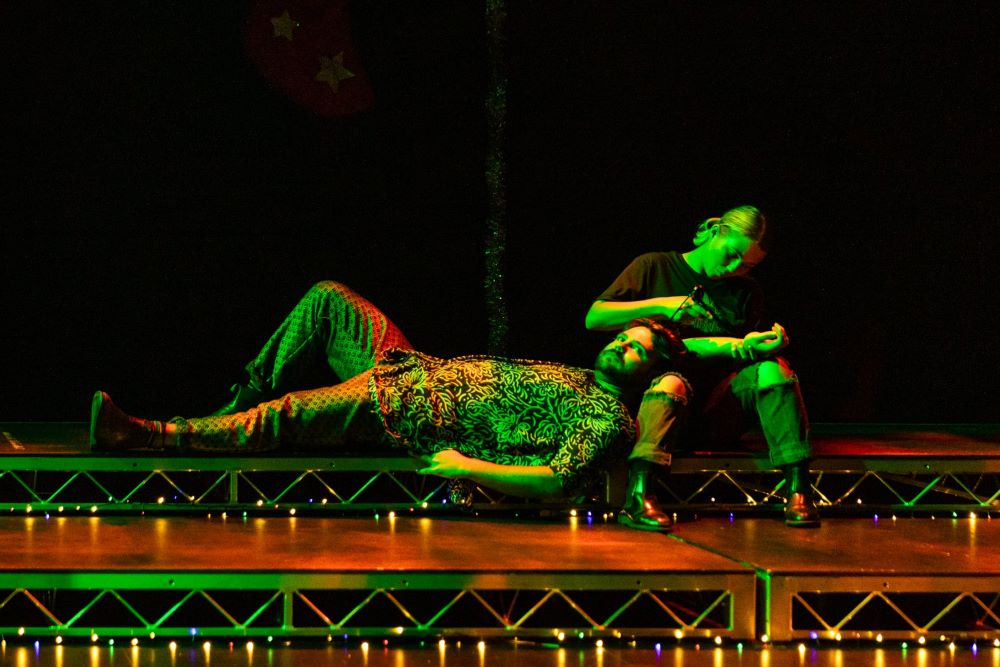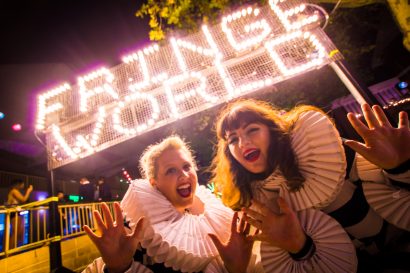Who’d want to be embarking on a career in the performing arts right now?! Patrick Gunasekera takes a look at the challenges facing arts graduates and discovers hope for the future.
Graduates hope for arts future
15 December 2020
- Reading time • 9 minutesMulti-arts
More like this
- Halloween special: How to make blood and other stage tricks
- Seadragon weaves magic spell
- Spring into the school holidays
For performing arts students undertaking their third year in 2020, the pandemic has wreaked a complex challenge. Students have had to grapple with COVID anxiety, broader arts industry uncertainties and the pressures to adapt to online performance training.
This snapshot of graduating arts students reveals their struggles but also their resilience, hope and courage as they contemplate entering the arts industry.

Graduating in isolation
Percussionist/composer Germaine Png from the Western Australian Academy of Performing Arts persevered through her final year of a Bachelor of Music from her Singapore residence in self-isolation. Making new instruments from home, producing electronic music to support Perth performances by WAAPA’s Defying Gravity percussion ensemble, and pre-recording her graduation recital have been some of the vital adaptations Png has risen to this year as a Classical Performance student.
“We are so used to having this pressure put on us to meet creative deadlines, which has definitely helped with our ability to find new ways to adapt. Because unlike other professions, ours can be very flexible in a way,” Png explained.
“Obviously it’s been difficult, as I’m very used to meeting up with people in real life and brainstorming ideas using actions and actually showing them stuff. [But] it’s been really nice to be able to still be a part of that, even though I’m miles away from everyone else, even up until now.”
Png found keeping personally connected and creatively active with her peers was crucial.
“Generally as artists, even without a pandemic, we are quite an understanding bunch. Especially in this time, having that skill to be a little more patient with others has been helpful to most people.”
Scrutinising the artform and the industry
For performance artist and Bachelor of Performing Arts student Henry Boles, the year raised a lot of questions about the value of theatre and why we gather in spaces.
When WAAPA’s Performance Making course transitioned to online learning at the onset of the pandemic, Boles wrestled with how his creative medium had veered away from its foundations.
“For me, theatre is a live art, and it has to be two bodies convening in the same space… I just couldn’t find the motivation, the energy, or the enthusiasm to want to be taking in this information in a digital form.”

Boles was also concerned that the industry did not take adequate steps to consider how a just and inclusive transition to an online arts world could have transpired for the benefit of all artists.
“[Online] there’s a lot of work being made, and a lot of it is being presented and made by the same people. We’re back to a relatively closed loop of people, and there’s not a lot of time to think about the structure and think about the way it can be more accessible and given to a wider audience.”

Artists are fighters
For actor/singer/performer Giorgia Kennedy, the arts landscape in 2020 holds promise.
“The biggest take away for me with COVID is that artists are fighters, and they’re resourceful,” Kennedy said. “They will find a way to tell stories and to create art and band together as a community no matter what.”
As a third year student of WAAPA’s Bachelor of Arts in Musical Theatre, Kennedy found the challenges of this year’s transitions to online learning resulted in artistically meaningful outcomes for her cohort.
“[We] haven’t had as much face to face support with teachers, so we’ve all had to figure out who we are as artists individually. But coming together at the end of the year, there’s this really grounded energy that I feel – that everybody knows who they are and knows what they’re about in a way that we didn’t at the start of the year.”
A versatile future
The consequences of COVID-19 on an already overtaxed final year has influenced the creative capacity of students and their decisions about the future.
Considering the tremendous stress the pandemic has placed on third year arts students, Boles said, “I would support people who said they’re not going to make work for a year, and I think at the end of the day that will benefit the work they create in two or three years’ time just by having taken that moment.”
Kennedy felt similarly about the burdens of artistic productivity, stating, “There is such pressure when you graduate that you have to jump straight into the biggest show, and if you don’t, you’re not successful. But I think there’s been a shift and a learning that if you want to be an artist, you have to love telling stories, and you have to love community.”
Kennedy optimistically added, “There’s going to be a much bigger focus on smaller work and smaller communities of people telling stories, and I’m really excited to see what my cohort comes up with. They’ve got music coming out, they’ve got Fringe shows, it’s unrelenting and I’m really excited to see the smaller, more individual works that are going to come out of COVID.”
Crisis empowers creativity
Theatre maker Alexa Taylor, who is also a lecturer in performance making at WAAPA, said the year’s substantial disruptions had also empowered creative growth in her students. “A lot of really exciting creativity comes from a place where you’re not worrying too much about the final product, and so having the process interrupted where we didn’t know what the final product would look like meant that the students were focused on a place of figuring out what they wanted to say and figuring out how they wanted to say it with each other.”
She was also excited about the critical thinking demonstrated by this year’s graduate students, adding that, “I can see people in there with a strong, passionate sense of the type of arts world that they want to inhabit, which might look a little bit different from the way the current arts world is set up, so I’m really excited to just see them get in there and make that and do that.”
As Png reflected, “This is the year you pretty much define yourself before you go out into the big world. Being final year students, having this thrown at you is going to change your craft in some way, and I’m very excited to see how people have grown, and to see and hear their stories.”
For arts graduates, 2020 has fortified the importance of a community-oriented, collaboratively responsible and kind arts industry. It’s an arts industry we all need, and perhaps the inclusive values, determination, and care demonstrated by these grads means the COVID generation will lead the way.
Pictured top: Germaine Png performs at a community event in 2019. Photo by Annie Harvey
Like what you're reading? Support Seesaw.






